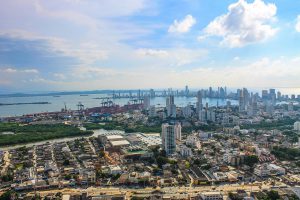Peace remains illusory for many Colombians a year on from the signing of a historic deal with guerrilla group the Revolutionary Armed Forces of Colombia (FARC).
Tensions over land and natural resources persist in rural areas despite an end to the conflict. This is in part because the government continues to prioritise the extraction and export of commodities such as oil without properly consulting affected communities, according to Camilo González Posso, director of Colombia’s Institute for Peace and Development Studies (INDEPAZ).
“The economic model has helped reproduce violence over the past 60 years,” he says.
González Posso recently told an audience at the Javeriana University in Colombia’s capital Bogotá that conflict persists because the state remains susceptible to capture by private interests. The Colombian government has exclusive authority to award concessions for extractives projects through the National Mining Agency (ANM).
Colombia is now entering a phase of “low-intensity” conflict, González Posso says. While the frequency of conflict may have diminished and the perpetrators of violence may be changing, rural communities still suffer the consequences, he added. Earlier this month, another left-wing guerrilla group, the National Liberation Army (ELN), agreed a first ever ceasefire.
Since the 1940’s, Colombia has experienced complex and bloody civil conflicts involving security forces, left-wing guerrilla groups and right-wing paramilitaries that have left hundreds of thousands dead and millions more internally displaced.
Oil conflict
The Nogal oil block in the southern former FARC stronghold of Caquetá is an example of resource-related conflicts taking place all over the country, says Joel Ross, Latin America analyst at UK consultancy Verisk Maplecroft.
Drilling in the Nogal block, which is owned by Emerald Energy, a British subsidiary of China’s Sinochem, will cause irreparable damage to the water and soil that sensitive Amazon ecosystems and communities depend on, opponents say.
“Societal opposition to extractives projects is reaching an all-time high in Colombia,” says Ross. He recommends that investors looking at post-peace deal Colombia carry out a “thorough and exhaustive” assessment of potential environmental, social, and policy risks, which also include violence associated with drug-trafficking and illegal gold mining.
Engaging in early dialogue with local communities and understanding communities’ concerns and demands will help mitigate the risk of unrest or social opposition to projects, Ross adds.
Carlos Andrés Santiago, a spokesperson for the Defense Corporation for Water, Territory and Ecosystems (CORDATEC), says: “We’re moving towards conflicts in defence of water, resources and territory.”
The organisation, which opposes fracking in the northern department of César, demands an alternative development model that considers the principle of “buen vivir” (‘living well’ or ‘good living’) and respects the rights of nature.
With the departure of the FARC, the biggest fear for some communities living around the sites of new development projects is what comes next, as the armed group’s presence provided a form of authority and control.
“We are not closed to foreign investment, we are not against development” says Ernesto Ramirez Flores, of the Association of Community Councils and Organisations of Bajo Atrato (ASCOBA), a densely forested river basin in the north-west Chocó department of Colombia that borders Panama.
“What we’re asking is that investment agrees with our culture and our vision, and above all, with the wishes and permission of our communities,” he adds.
Ramirez says that the state has had little presence in the region and that communities co-existed with FARC. He stresses that communities retain the legal right to be consulted on projects in their territory.
Vanessa Torres, a researcher at non-governmental organisation Ambiente y Sociedad (Environment and Society) says many development projects had stalled in Colombia because of the presence of guerrillas. “It’s not just oil, but also mining and infrastructure too,” she says.
The peace deal with FARC set out new norms for the development of the territory the group formerly controlled, including fast-tracking the approval of many projects. The Colombian government says that this facilitates the arrival of foreign investment.
“We have a more attractive destination for business, for the arrival of more tourists to areas of the country that were isolated by war, and for more investors to establish themselves in the country,” Felipe Jaramillo, president of trade promotion agency ProColombia, recently told Spanish newspaper El País.
However, Torres says that plans to grant the executive branch of government more decision-making power over new projects by bypassing the legislature are dangerous. Many of the projects require detailed technical analyses to determine what their impacts will be.
“Going through Congress doesn’t guarantee that a proper approval procedure will take place. But it does give you time,” says Torres, who has had access to some of the proposed projects.
In May this year, Colombia’s constitutional court declared that a 2016 law aimed at streamlining the approval of development projects was unconstitutional. The court ruled that the Legislative Act for Peace, known locally as the Fast Track law, threatened the democratic principle of separation of powers.
Chinese presence intensifies
In May 2015, Chinese premier Li Keqiang travelled to Colombia in the first trip by such a senior ranking politician from China in 35 years.
Shortly before Li’s visit the two countries signed an economic and technical cooperation agreement that would see China disburse funds to Colombia to assist in the country’s process of territorial re-ordering in the post-conflict period. However, this type of agreement does not contain any provisions on social and environmental management.
Colombia is something of an anomaly for an Andean country in terms of its relations with China, according to Torres, who has been following the arrival of Chinese investment in the country.
Unlike Peru and Ecuador, investment has arrived more slowly owing to long and costly processes and accusations by Chinese companies that the Colombian government has favoured Brazilian competitors.
With graft-tainted Brazilian infrastructure giant Odebrecht selling assets in Colombia, China’s presence is “intensifying”, Torres says, but points out that until now investment has focused mainly on hydrocarbons.
Wu Guoping, a Latin America expert at the Chinese Academy of Social Sciences, says that oil is an important source of revenue for Colombia, and that China’s interest in Colombia’s oil meets the needs of both countries.
However, Wu says that around ten years ago, the Colombian embassy in Beijing tried to lobby Chinese companies to invest in its oil sector, but with little success. At the time, Colombia was looking to expand the oil sector and belie the perception that it was only an exporter of coffee.
Today, Colombia needs to diversify its exports to China to include products like fruit, Wu said in an interview with local business publication Portafolio. Wu said the drop in the price of oil has hit the overall value of trade between China and Colombia, and that the latter should look at countries like Chile and Peru, which sell a wider variety of products to the Chinese market.
But with such strong social opposition, extractive industries face more than economic challenges in Colombia. Ross points out that some local authorities are planning to hold popular votes that could ban mining activities in their jurisdiction.
“Any legally binding precedent would be catastrophic for the sector,” he says.
This article is republished from Diálogo Chino






